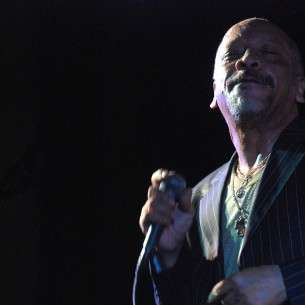By Catalina Maria Johnson
“What does a good salsa singer really do?” says Omar Torres-Kortright, co-founder of Agúzate, an organization which promotes and celebrates Afro Latin culture and music in Chicago. This is the question that is musically answered in several nights of the the 3rd Festival of Improvised Afro-Caribbean Music, which opens tonight at Old Town School of Folk Music at 8:30 pm with the annual tribute to the improvisational singer (now in it’s 10th year).
This year’s tribute brings renowned sonero Ismael Rivera, Jr., son of beloved salsa great Ismael Rivera and an extraordinary singer in his own right, to the opening concert of the festival which is a homage to his father. Rivera, Jr. will be accompanied by an orchestra of talented local musicians led by Chicago pianist and Orchestra Director Edwin Sánchez.
Torres-Kortright continues to describe the importance of the improvisational singer in the art form, “There are so many elements in salsa that are improvised and come from jazz and that are well-known and which establish a dialogue, like for example, the percussion and the horns. We wanted to explore what the singer adds to the mix”. He explains that the crafting of improvised vocals add a texture and emotional intensity which gives classic salsa a special touch.
Unfortunately, Torres-Kortright explains, this improvised art is on its way to extinction. In recent years, newer generations of musicians have ceased to cultivate the art. “Just singing well”, says Torres-Kortright, “is considered to be enough, and improvisation has taken a second place…what is being lost is the art that adds diversity, magic, sense of humor, the language of the barrio…”.
This decline occurred after improvised singing peaked during the Golden Age of salsa in the 60’s and 70’s. In the 80’s romantic salsa took over as consumers’ tastes changed and this coincided with the period when the great record label Fania stopped recording. Salsa entered a period of “creative decadence”, says Torres-Kortright, where “the formula was not to have a great sonero, but a pretty voice and pretty face to sell records”.
So Torres-Kortright and his colleagues at Agúzate and Old Town School of Music have set out to highlight and celebrate anew what he calls “a most important musical marriage – the union of Afro Caribbean music with jazz”. He highlights another special event planned for the Festival which will be part of the opening of the new Segundo Belvis Cultural Center.
The concert at Segundo Belvis Cultural Center will feature a world-premiere of a new project, Proyecto Libre, led by extraordinary Chicago violinist James Sanders, as well as local bomba singers Buya. Torres-Kortright promises more improvisation when both bands take the stage together and concludes, “That night is something that never will repeat itself, and that is what is at the heart of the magic of the union of African American jazz and Afro-Antillean musical folklore. Let’s see what happens!”

